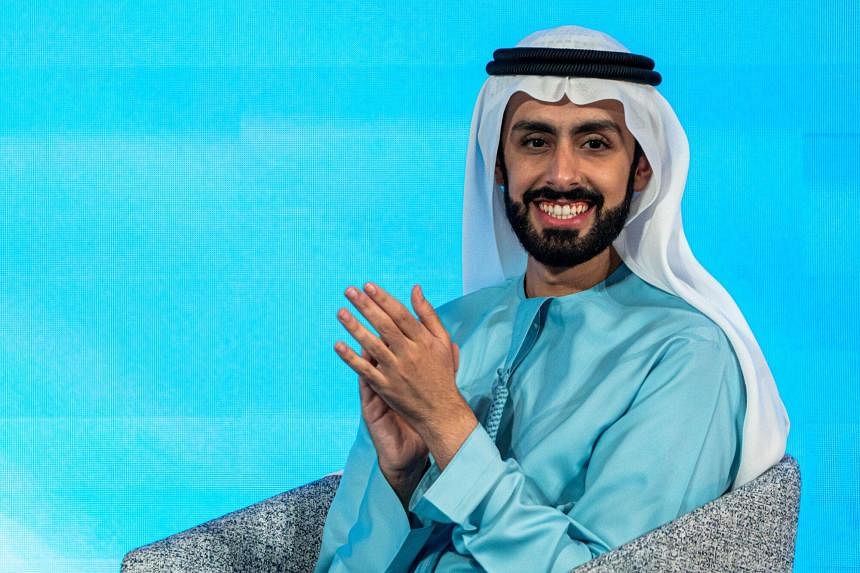HONG KONG – A little-known Dubai royal has made headlines in Hong Kong after his high-profile plan to open a US$500 million (S$674 million) family office in the city was suddenly delayed.
Doubts about Sheikh Ali Rashed Ali Saeed Al Maktoum’s commitment to the venture deepened over the past week, after the local media uncovered his sideline career as a pop singer and revealed that the authorities did not vet his background before letting him meet the city’s top leader.
The incident has cast a shadow over Hong Kong’s ambitions to attract the super-rich to set up family offices in the financial hub. It also comes as the city increasingly looks towards wealth in the Middle East as a source of foreign investment.
Sheikh Ali, whom the United Arab Emirates consulate confirmed is a relative of Dubai ruler Sheikh Mohammed bin Rashid Al Maktoum, on March 27 abruptly halted plans for the official opening of his Hong Kong family office the next day.
His office said he had to see to “urgent matters in Dubai”, and in a subsequent flurry of statements over the following week, insisted that the sheikh remained committed to his plan and would formally open the office at the end of May when he visits Hong Kong again.
Sheikh Ali’s planned office, located within Shun Tak Centre in Sheung Wan, shares its space with an investment firm linked to late Hong Kong billionaire Stanley Ho, local newspaper South China Morning Post (SCMP) reported.
Sheikh Ali was among a group of important guests who met Chief Executive John Lee and spoke at a major wealth summit in Hong Kong in late March.
In an interview with Bloomberg earlier that month, he said he decided to set up his family office in Hong Kong because “I got to see a lot of similarities with Dubai. There’s potential for long-term growth”.
The sheikh’s exact ties to Dubai’s ruling family as well as the size and source of his wealth have not been disclosed.
Singing sideline
Following news of the last-minute change, SCMP reported, citing unnamed government sources, that the authorities did not conduct due diligence in verifying the 28-year-old sheikh’s personal and financial background before inviting him to meet Mr Lee and speak at the high-level investors’ forum.
The paper later identified Sheikh Ali as a pop singer and songwriter known as Alira, who has a fan base in the Philippines, where his Tagalog performances gained popularity in 2022.
Videos on YouTube show Alira singing on stage at the Expo 2020 Dubai, with a presenter praising the Emirati singer for his unique range of vocals, describing him as a “multi-talented celebrity performer (who) sings not only in his native Arabic, but also in English, Hindi, Filipino, Chinese, French and other languages”.
Sheikh Ali’s office has so far evaded questions about his musical career, and did not respond to queries from The Straits Times.
Hong Kong government adviser and barrister Ronny Tong said the authorities might initially have hoped to publicise Sheikh Ali’s planned investment in the city “because he’s from an acclaimed royal background, or he might be the only person willing to be the focus of such attention”.
“Most mega-rich people prefer to keep a low profile in relation to their investment strategies,” Mr Tong said, noting that the prince’s US$500 million family office “is by no means the biggest in Hong Kong”.
“But if the government wishes to promote the city’s family office policy by publicising some examples, then they should really be more careful and do the proper background checks first to make sure they don’t end up with egg on their face,” he added.
‘Too eager’
“The government is too eager to attract people to come here,” Mr Simon Lee Siu-po, an honorary fellow at the Asia-Pacific Institute of Business at The Chinese University of Hong Kong, told ST.
“Government departments could work closer together (in undertaking background checks); the lack of coordination has caused many problems in the past.”
Hong Kong has been trying to attract wealthy family offices to set up shop in the city as it seeks to restore business confidence after a prolonged economic slump.
In 2023, the Hong Kong government announced measures to lure more family offices to the city, including a revamped investment migration scheme and hefty new tax concessions.
In 2022, Mr Lee said he aimed to draw more than 200 family offices with at least HK$240 million (S$41 million) in assets to establish or expand their operations in Hong Kong by the end of 2025. As part of that campaign, the Chief Executive visited the Middle East and signed a deal with Dubai to coordinate family offices.
But the saga highlights Hong Kong’s inadequate understanding of the Middle East even as the authorities – taking a cue from the strategic interests of the central government in mainland China – pursue the region’s wealth, said Mr Bernard Chan, chairman of non-governmental think-tank Our Hong Kong Foundation.
He noted that while the Hong Kong government had in 2007 already tried to form ties and promote business cooperation through a study tour to Riyadh, Saudi Arabia, Abu Dhabi and Dubai, not much progress had been made until the past year.
In a Facebook post on April 6, the Financial Services and the Treasury Bureau said the government was planning another trip to the Middle East, without giving a specific timeframe.
“Promoting the development of the family office business... has become a hot topic in Hong Kong lately, but society seems to have little in-depth understanding of it,” the bureau said, without directly mentioning the Sheikh Ali incident.
“The establishment of a family office in Hong Kong does not require special government approval, nor does the government make any investment in or provide any financial support to individual family offices in Hong Kong,” it added.
The deferment of the launch of Sheikh Ali’s family office did not necessarily mean that the sheikh’s plan has been scuppered, Mr Loh Kia Meng, chief operating officer at Dentons Rodyk law firm in Singapore, told ST.
“A family office is like any other business enterprise, and there are many reasons why a business may delay the commencement of its operations,” said Mr Loh, who specialises in the legal aspects of wealth planning.
He listed potential factors such as the economic outlook, capital funding, or delays in fielding key appointment holder positions.
“There has not been news of the family office committing to certain investments such that a delay would adversely impact its other investments, so I do not see this as a major snag,” he said.
Competition with Singapore
Hong Kong’s move to attract more family offices comes as such entities mushroomed in Singapore in recent years.
A Deloitte study in March put the number of single-family offices in Hong Kong at more than 2,700. Total assets under management (AUM) in the city came up to HK$30.5 trillion as at end-2022, the report said.
Singapore, meanwhile, had about 1,400 single-family offices that had been awarded tax incentives as at end-2023, according to information from the Monetary Authority of Singapore’s website. Total AUM was $4.9 trillion at end-2022, it said.
“Many large family offices set up offices in both Hong Kong and Singapore to diversify and hedge risks,” Mr Loh said.
“As the family office regimes between Hong Kong and Singapore differ, the published data on the total number of family offices in the two countries may not be as meaningful as the total AUM, which is the better measure of who manages the bigger pot.”
In terms of qualifying requirements for tax incentives, Singapore might be seen as being more stringent than Hong Kong, Mr Loh said, as a family office must employ a non-family member investment professional and invest a minimum amount in Singapore. Hong Kong has no such requirement.
“Hong Kong’s model may be seen as giving more flexibility to family offices and may therefore draw more investments to the city. I think that has worked well for Hong Kong so far,” he added.


